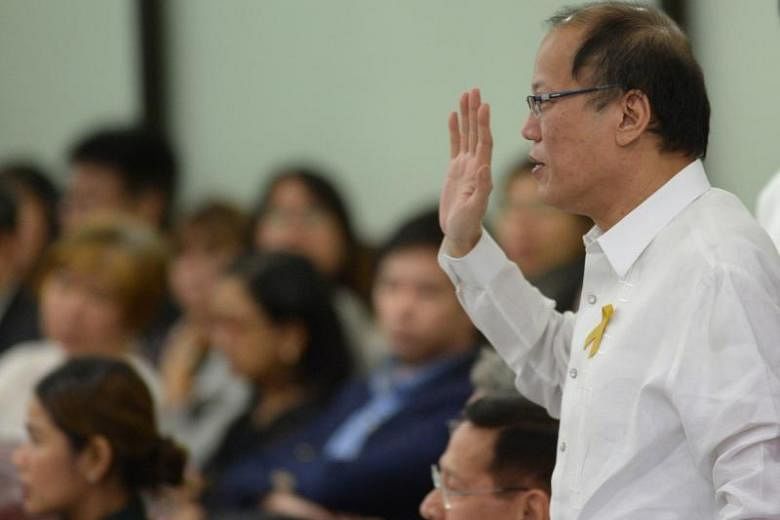MANILA (AFP) - Former Philippine president Benigno Aquino has been indicted in a 72-billion-peso (S$1.83 billion) criminal case over his failure to get congressional approval to use state funds to jump-start major government projects, the authorities said on Wednesday (June 20).
The money became a source of controversy during Aquino's term from 2010 to 2016, with critics claiming he used it to barter for favours from legislators. He has always denied any wrongdoing.
The charge, filed last week by a special anti-corruption prosecutor but only made public on Wednesday, alleges that Aquino violated the Constitution's separation of powers.
In the indictment, prosecutor Conchita Morales alleged Aquino wrote a series of instructions to his budget minister to funnel 72 billion pesos into a special initiative in June 2012.
"Without the approval of the said memoranda by respondent Aquino, (the budget ministry's fund release order) would not have been issued," Ms Morales said in a statement.
Aquino branded the initiative, the Disbursement Allocation Programme, an attempt to speed up public spending in the notoriously bureaucratic nation in order to boost economic growth.
The scheme redirected money left unspent in agencies' budgets to other parts of the government that needed funding for projects.
The programme began in 2012, but Aquino was forced to halt it two years later, after the Supreme Court ruled it violated a constitutional provision which gives the legislature sole power to authorise government spending.
Aquino had yet to receive a copy of the indictment alleging "usurpation of legislative powers", his spokesman Abigail Valte told AFP.
"We're quite curious to study how the (prosecutor) arrived at a reversal of its previous decision finding no liability on the part of former president Aquino," Ms Valte added.
The prosecutor dropped the case in 2015, but reversed herself following an appeal by a group of legislators and anti-corruption campaigners.
If convicted, Aquino could face up to two years and four months behind bars.
Both of Aquino's predecessors were hit with charges after their terms ended.
Mr Joseph Estrada, a populist movie star who swept to a landslide electoral win in 1998, was arrested in 2001 shortly after a bloodless popular revolt cut short his six-year mandate.
A court sentenced him to life in prison for plunder in 2007, but he won a pardon from his successor Gloria Arroyo less than six weeks later.
Ms Arroyo, who ruled for nine years, was arrested in 2010 and charged with rigging the 2007 senatorial election, a case which carries a life sentence but which remains under trial.
She was released from nearly five years in detention in 2016, shortly after Mr Rodrigo Duterte was elected president, when the Supreme Court acquitted her on charges of misusing 366 million pesos in state lottery funds.

